- Details
- Category: Industry News
There continues to be small signs of optimism in the travel sector according to new research issued on May 20, 2020, by the business travel and meetings trade organization Global Business Travel Association (GBTA). Health and safety measures have always been a cornerstone of travel and are now of significant importance as the industry tries to gain momentum for recovery.
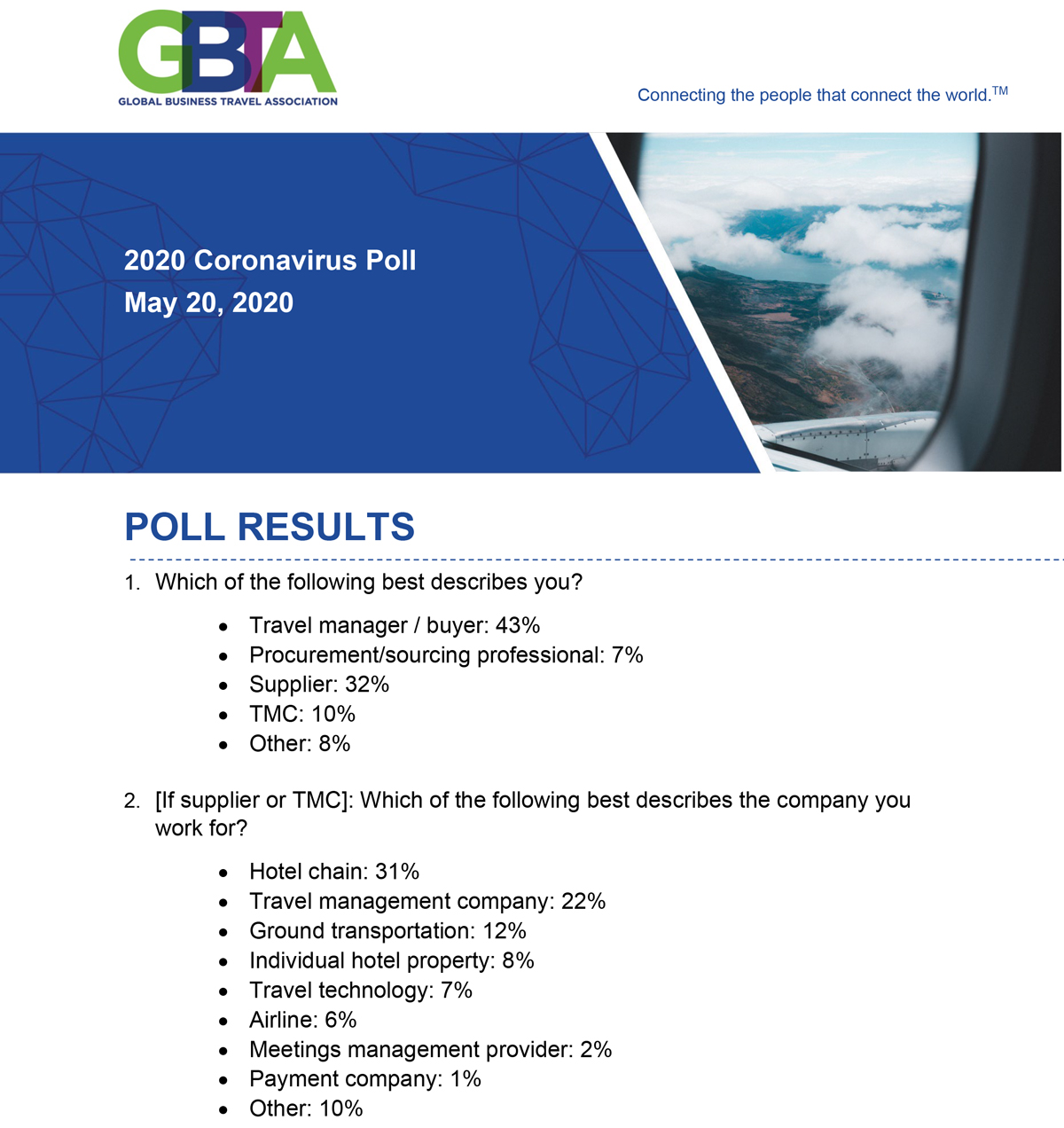
“People aren’t going to travel until they feel safe,” said GBTA CEO Scott Solombrino. “Our member companies want to see several health and safety steps taken at every stage of the travel process—from ground transportation to airlines to hotels. As restrictions across the globe begin to lift, small green shoots of optimism are sprouting in the industry with more than half (54%) of companies considering resuming all travel in the near future. That is a positive, albeit small, sign that we are finally headed in the right direction.”
To understand the coronavirus’s effects on business travel, GBTA conducted its seventh poll among membership between May 13 and 15, receiving 1,705 responses from GBTA member companies throughout the world. View the poll results.
Key Findings
Most GBTA member companies that report canceling or suspending most or all trips to a specific region/country plan to resume business travel in the new future or are considering resuming travel.
- One in four report their company plans to resume travel to the U.S. (28%) and/or Canada (24%) in the near future.
- Four in 10 report their company is considering resuming travel to the U.S. (44%), Europe (43%), and Canada (41%) in the near future, but currently do not have definitive plans about when travel will resume.
- Half (54%) are considering resuming all travel (regardless of country or region) in the near future, although they do not currently have definitive plans for when it will resume. In addition, only one in 10 (14%) report they do not plan to resume all travel in the near future.
Plans to Resume Business Travel
| Destination | Plan to Resume in Near Future | Considering Resuming in Near Future, But No Definite Plans | Do Not Plan to Resume in Near Future | Not Sure |
| China | 11% | 34% | 36% | 19% |
| Hong Kong | 9% | 36% | 35% | 20% |
| Taiwan | 9% | 35% | 36% | 21% |
| Asia Pacific (minus China, Hong Kong, and Taiwan) | 11% | 36% | 34% | 19% |
| Europe | 16% | 43% | 25% | 16% |
| Latin America | 11% | 37% | 32% | 19% |
| United States | 28% | 44% | 16% | 12% |
| Canada | 24% | 41% | 20% | 16% |
| Middle East/Africa | 9% | 36% | 35% | 20% |
| All International Travel | 10% | 42% | 29% | 19% |
| All Domestic Travel | 35% | 45% | 10% | 11% |
| All Travel | 15% | 54% | 14% | 17% |
GBTA member companies are strategic in their planning for a resumption of domestic business travel. Many plan to initially resume travel to specific states/regions and limit travel in other areas, while others plan to wait until they feel comfortable resuming travel anywhere in the country.
- One-third (35%) of U.S.-based member companies report they will resume travel in some states or regions but will continue to limit travel in other states or regions.
- Another four in 10 (43%) will wait until they feel comfortable resuming travel anywhere in the U.S.
- Half (50%) of non-U.S. members say they will wait until the feel comfortable resuming domestic business travel throughout the country, while one-third (36%) say they will allow travel in some areas or regions of the country but continue to limit travel in other regions of the country.
- These companies expect their employees will be willing to travel for the first six months after restrictions are lifted. A majority (62%) believe most or some employees will be willing to travel after restrictions are lifted.
- Many report they allow some essential business travel. Almost one in four (37%) allow for some essential business travel, while more than half (56%) have canceled or suspended all business travel.
Hotels/Lodging
When asked what steps hotels can take to help alleviate concerns about traveler health and safety, increase cleaning standards to exceed current cleaning protocols (80%), require employees to wear face masks (55%), provide additional staff training about COVID-19 sanitary practices and incident reporting (53%), increase communication about hotel sanitation practices (44%), require guests wear face masks in common areas (43%), and enforce physical distancing guidelines (43%) were most frequently cited.
Ground Transportation
GBTA members feel the ground transportation industry can take several steps to help alleviate concerns about their employee’s health and safety while traveling for business. Key actions include increase cleaning standards to exceed current standards (70%), provide hand sanitizer and disinfectant wipes to customers (68%), require drivers to wear face masks and gloves (58%), install a partition to separate the passenger from the driver (52%) and train drivers about sanitary practices (43%). Other actions ground transportation companies can take to help alleviate health and safety concerns include:
- Provide additional staff training about COVID-19 sanitary practices and incident reporting (36%)
- Require passengers to wear face masks and gloves (34%)
- Provide more communication and information concerning cleaning protocols (28%)
- Require drivers to stay in the driver’s seat and not assist with luggage or open the door (27%)
- Provide face masks and gloves to passengers (16%)
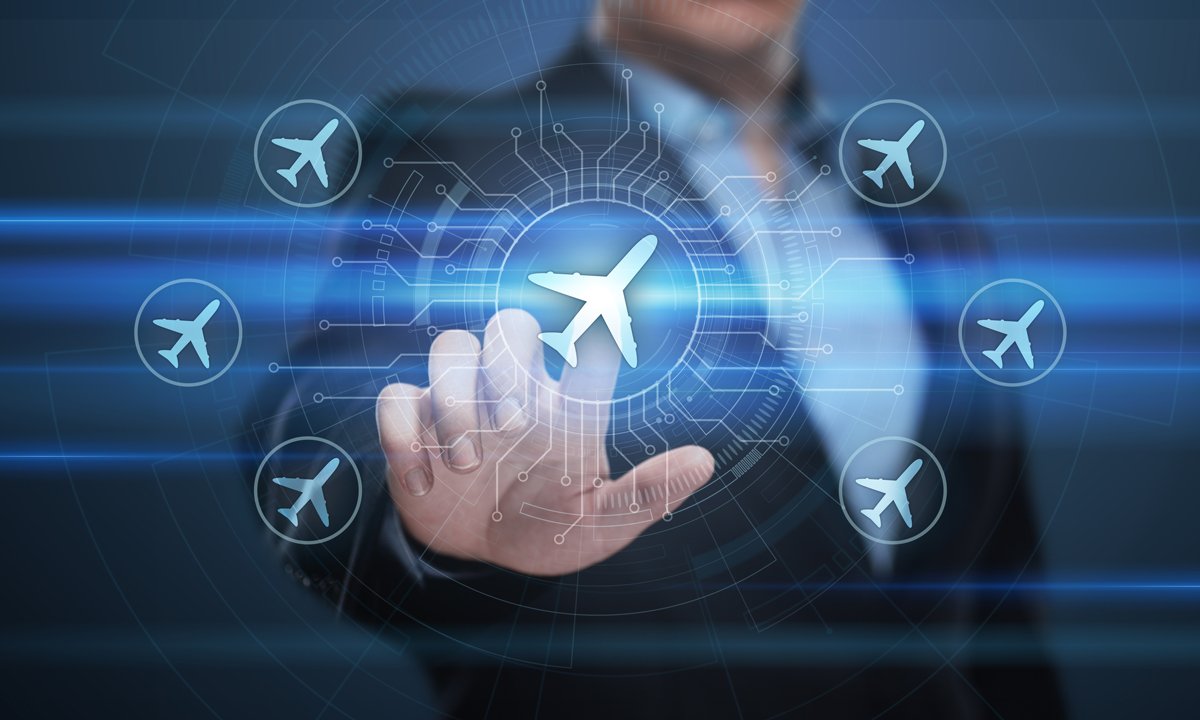
Air Travel
When asked what airlines can do to help alleviate GBTA member company concerns about traveler health and safety, key actions include: increase airplane cleaning standards to ensure every traveler touchpoint is sanitized before each flight (76%), require passengers to wear face masks (60%), keep the middle seats empty (59%), require employees wear face masks and gloves (52%) and provide all passengers with hand sanitizer and disinfectant wipes (47%). Other actions airlines can take to help alleviate health and safety concerns include:
- Provide additional staff training about COVID-19 sanitary practices and incident reporting (27%)
- Provide all passengers with face masks (23%)
- Suspend or reduce in-flight food and beverage service (17%)
What Will Make Companies Feel More Comfortable About Traveler Health and Safety
| Actions | Airlines | Hotel | Ground Transportation |
| 1 | Increase cleaning/sanitation protocols—76% | Increase cleaning standards—80% | Increase cleaning standards—70% |
| 2 | Require passengers wear masks—60% | Require staff wear masks—55% | Provide hand sanitizer and disinfectant wipes—68% |
| 3 | Keep middle seats empty—59% | Provide staff additional COVID-19 sanitary training—53% | Require drivers wear masks and gloves —58% |
| 4 | Require staff wear masks and gloves—52% | Increase communication about hotel sanitation practices—44% | Install partition between driver and passengers—52% |
| 5 | Provide hand sanitizer and disinfectant wipes—47% | Enforce physical distancing and require guests wear face masks in common areas—43% (each) | Train drivers on sanitary practices—43% |
Thinking about information needs as they pertain to supplier cleaning and sanitation practices, half (48%) of respondents feel they have enough information while one-third (36%) would like more. Only one in 10 (15%) say they do not have enough information. GBTA member companies in North America (51%) are more likely than member companies based in Europe (32%) to say they have enough information on supplier cleaning and sanitation practices.
Methodology
GBTA conducted a poll of its members across the globe from May 13-15, 2020. A total of 1,705 responses were received.
Visit gbta.org for more information.
[05.20.20]
- Details
- Category: Industry News
It was a much-needed message of unity, camaraderie, and strength as hundreds of operators worldwide tuned in to the National Limousine Association’s Facebook page on May 12 for the mammoth No Operator Left Behind (NOLB) Virtual Summit. The nearly five-hour session featured a half-dozen speakers and was moderated by NLA President Robert Alexander of RMA Worldwide and Bill Faeth of Limo University. At times sobering, often optimistic, but always enlightening, the NOLB Summit probed many aspects of travel and entertainment as operators attempt to safely navigate the next phases of the economy’s reopening. The event culminated with a message of hope and overall well-being—physical as well as mental—from two doctors who are on the frontlines of the COVID-19 crisis every day.

The event was sponsored by Grech Motors, Chosen Payments, Jaco Limousine, Limo & Bus Compliance, and Limo Anywhere.
“The one thing I think everyone is lacking—because they’ve been in lockdown so long—is patience. We all want the business to be back tomorrow, and what tomorrow looks like is what we’re all trying to figure out,” said Alexander during the event. “A key takeaway? There’s optimism.” He also added that people are seeing an uptick in reservations, a positive sign that the public is feeling more confident to once again venture beyond their homes.
If there was one constant throughout the Summit, it’s that every corner of the economy has been touched by this pandemic, albeit it in varying degrees, and every business owner is grappling with how to protect their team and clients for the foreseeable future. The industry can learn from what vertical markets are doing to improve our own response to safety measures, especially from those businesses that didn’t have the unexpected “benefit” of a shutdown and had to put novel safety protocols in place on the fly.
 Bill Faeth (left) and Robert Alexander (center) interview Roger Dow of the U.S. Travel Association
Bill Faeth (left) and Robert Alexander (center) interview Roger Dow of the U.S. Travel Association
Roger Dow of the U.S. Travel Association offered his snapshot of what’s happening to the vital travel sector at home. He prognosticated that our industry might actually have a leg up for a quicker recovery over other forms of transportation, including TNCs, because of the active and aggressive safety policies that operators are instituting. It was a sentiment that was echoed by Catherine Chaulet of Global DMC Partners and Angela Layton of the National Association of State Boards of Accountancy spoke about what the workplace might look like moving forward as more businesses see the benefit of employees working from home, as well as what would reassure their clients as they balance travel with their tolerance for risk—with clear communication from their travel partners. Alexander noted that the NLA is working on an SOP as a foundation for members to establish their own protocols.
Large-scale events in every state have been among the hardest hit, including sports and concerts, due to the restrictions on congregations. Stuart Ross of Red Light Management addressed how music events have been sidelined and what efforts the industry is taking to ramp up to a modified opening, although they have had some success with virtual events.
Sara McCall of Stunning and Brilliant Events, said that weddings are still happening, although many have been scaled down, offer different types of services (for example, plated dinners over a buffet), often include a virtual aspect, and new trends have been popular—yes, scented sanitizer stations are a thing. She sees the shift as an important but ultimately temporary measure until we are more comfortable where society is with the pandemic.
On a positive note, Jay Karen of the National Golf Course Owners Association, reported that golf courses had to pivot quickly to manage the crisis because many are open—and quite busy as more people are working from home and need an outlet. They’ve addressed everything from limiting the sizes of groups to spreading out tee times and even instituting touchless procedures wherever possible.
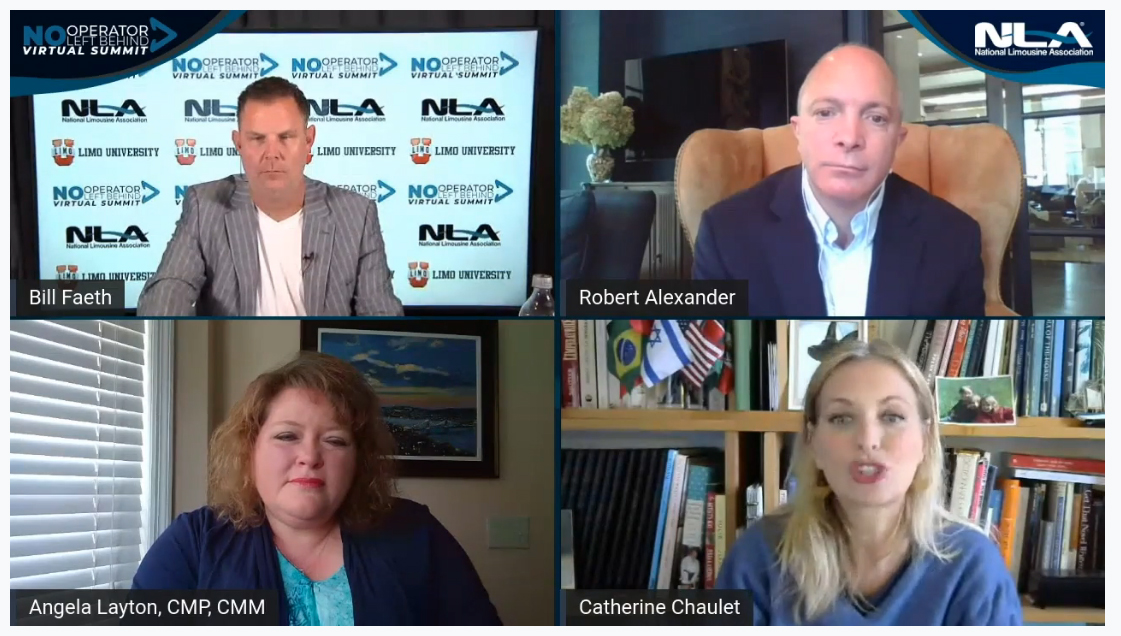 Guests also included Angela Layton of the National Association of State Boards of Accountancy (bottom left) and Catherine Chaulet of Global DMC Partners (bottom right)
Guests also included Angela Layton of the National Association of State Boards of Accountancy (bottom left) and Catherine Chaulet of Global DMC Partners (bottom right)
The final hour of the event was perhaps the most significant as Dr. James Doub of the University of Maryland and Dr. Lucy McBride of Foxhall Internists tackled the most immediate issues we are all facing with the pandemic: the fear of the unknown. Both addressed the imperative issues of staying physically healthy and protecting others from the spread of the virus, but also the tolls that it’s taken on mental health. They expressed confidence in the industry’s steps to operate safely by installing partitions, having the chauffeur and passenger wearing N95 masks (although less so on the use of gloves), liberally using hand sanitizer, and, of course, quarantining ill staff. Widespread testing and the possibility of a vaccine would be best.
A full recording of the NOLB Summit, complete with robust participation and real-time comments and questions from viewers, can be found on the NLA’s Facebook page.
Individual recordings can be found here:
Travel Industry Session featuring Roger Dow of the U.S. Travel Association
Meetings and Events Session featuring Catherine Chaulet of Global DMC Partners and Angela Layton of the National Association of State Boards of Accountancy
Recreation and Weddings Session featuring Jay Karen of the National Golf Course Owners Association and Sara McCall of Stunning and Brilliant Events
Live Entertainment Session featuring Stuart Ross of Red Light Management
Medical Industry Session featuring Dr. James Doub of the University of Maryland and Dr. Lucy McBride of Foxhall Internists
Visit the NLA’s COVID-19 response page for more information.
[05.15.20]
- Details
- Category: Industry News
Getting back to business was the topic of the May 12 meeting of the Florida Limousine Association (FLA) as the state is beginning to open up after some lockdown orders were relaxed in early May. Many businesses, such as restaurants and lodging are limited in capacity, while others including movie theaters remain closed in the tourism-reliant state.
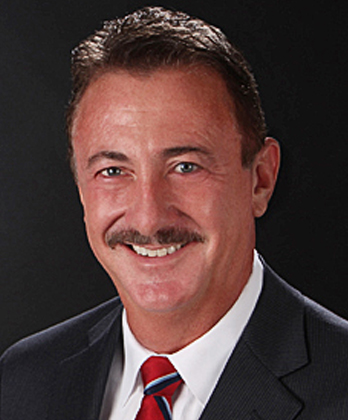 FLA President Rick Versace
FLA President Rick Versace
Representatives from the state’s airports were invited to give updates on what’s happening in air travel. Domestic travel is starting to slowly return as airports ramp up their cleaning and passenger screening protocols—although much of the latter is expected to be shouldered by the TSA and could potentially increase wait times as traffic increases. One notable exception is international travel, including from the U.K., as airports await the lifting of federal restrictions that were imposed on European travelers early in the national emergency. As such, airport officials don’t anticipate a robust June for international visitors. Most airports, including Orlando International Airport, are requiring chauffeurs and drivers to wear masks when on the property.
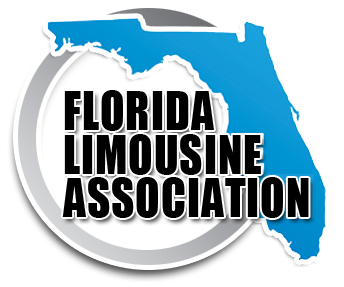
Operators participating in the online conference also discussed the ways they are cleaning and sanitizing vehicles, including installing partitions, wearing masks, and screening drivers. Additionally, deep cleaning options were shared, with Michael Miller of Cedillas offering some options. Among them were using microbial disinfectants dispersed through an atomizer to access hard-to-reach spots during evening deep cleaning and installing a UV light device directly in the roof of the vehicle, which would continuously sanitize the cabin while being safe for passengers’ eyes. The UV device, which is currently being tested for a larger market, is being used in President Trump’s limousines.
In an effort to standardize how Florida transportation companies protect their riding public, the FLA developed a list of protocols that it circulated to members:
- Vehicles go through a daily cleaning cycle, with a hospital-grade disinfectant.
- All common areas will be wiped down and disinfected between trips by drivers and chauffeurs.
- All drivers will be screened daily based on CDC and Department of Health recommendations.
- All drivers shall use PPE as required by local, state, and CDC recommendations.
- Glove wearing is promoted. Gloves to be worn while handling luggage.
- Safe passenger signs or placards depicting "this vehicle is deep cleaned daily in accordance with the CDC recommendations" should be positioned in vehicles reflecting driver's attention to safety.
- These protocols are mandatory, and masks are required to be worn by County Ordinance by both passengers and drivers. We have sanitizing equipment available at all our offices, drivers must make sure the car has been sanitized between each ride, and passengers are offered a sanitary package that includes a mask, hand sanitizer, and disinfectant wipes.
While the state is not yet operating at 100 percent, FLA President Rick Versace of A1A Airport & Limousine Service sees hope for luxury ground transportation in the top-down recovery.
“There could be a silver lining in this for our industry. People will be looking for transportation that they know and trust. Most of our vehicles are fleet-owned and go to our offices every day to be disinfected and sanitized,” Versace said to members. “Our passengers are first-class and business-class passengers that expect exceptional service. The airlines always cater to these passengers because they are the most profitable customers. These people are already starting to travel again and will be using us to drive them.”
Visit floridalimousine.com for more information.
[05.18.20]

